Chapter 23: Processing
I was feeling a lot of emotions coming to the surface about Dad’s death, Covid, and other things. I needed to work these feelings out.

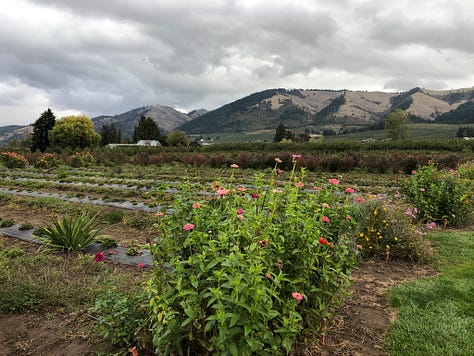
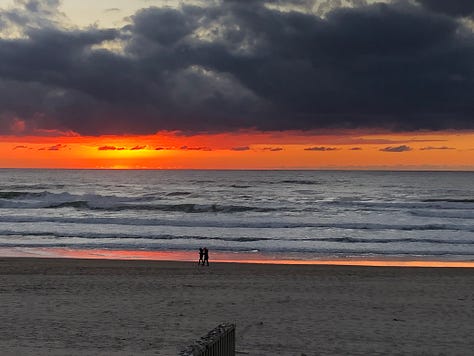

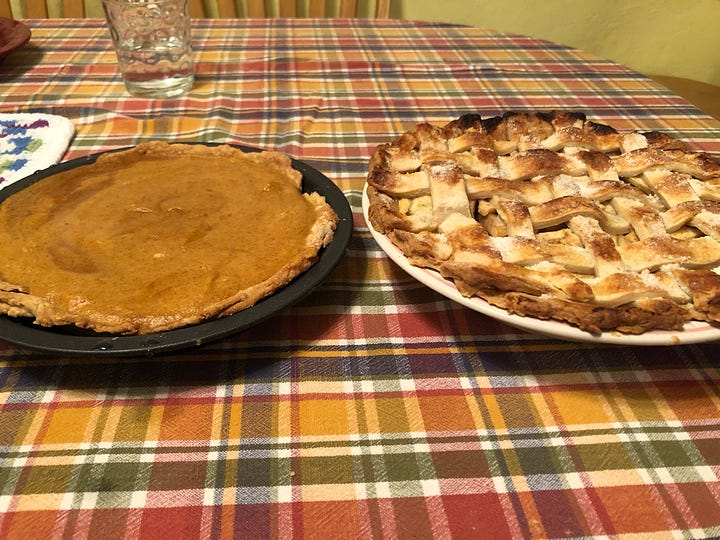
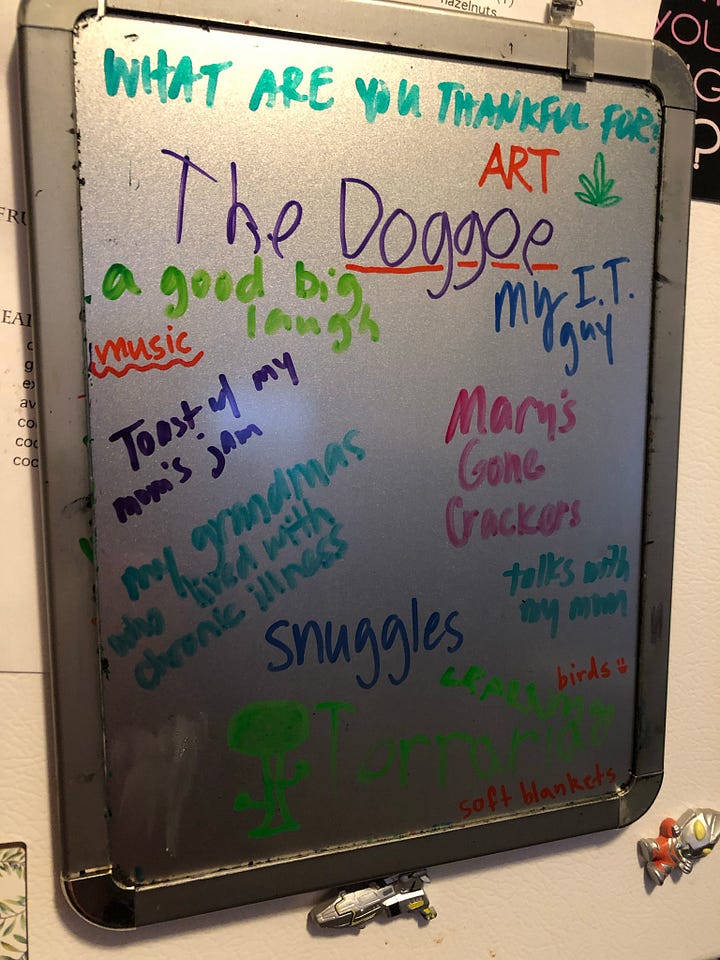

By the time my birthday came in 2020, the number of Covid cases in the United States surpassed 8 million. I was still pretty terrified of getting it, so we still isolated ourselves quite a bit and wore masks everywhere. The kids were in distance-learning school, which was ok, but also really hard. My kids have online groups of friends, but not being with their school peers, in person, really affected them. We tried so hard to tune in with their needs and stress, to help each other get through that time.
Several things happened that fall that helped make life bearable:
I got a silly birthday card and photos in the mail from my sister and her daughters. It really meant a lot to me and cheered me up.
The “Fruit Loop” drive through the Columbia Gorge and Mt. Hood
Sisters Retreat. We usually have our retreats in February, but all of us were losing our marbles so we needed a one sooner. My mom, sisters, sisters-in-law and honorary sister enjoyed a weekend at the beach, complete with gorgeous sunsets, talks, tears, karaoke and bra pong.
The election was over. At least for some of us.
A nice message from President Nelson, a man of science and a man of faith. He urged us to count our blessings, pray a lot, and get the darn vaccine.
Thanksgiving with Mom. Just me, my husband and our kids were with Mom for Thanksgiving. It was bittersweet - nice to be with Mom, but a little sad because Dad wasn’t there and we’ve had a big family Thanksgiving gathering at the church for the past decade or so.
Christmas season visit with Mom
January started off with a bang, so to speak.
Josh and I celebrated our 20th anniversary at the Skamania Lodge in the gorge. It was a beautiful place. We relaxed and went on drives and looked out at the beautiful gorge. Looking back, I felt things a little unsteady between us, but I attributed that to the stress of Covid and all being in the same house all of the time. The trip felt like a good break, a reset.
I had no idea that would be our last anniversary trip ever.
My spiritual questions and frustration with the church continued. Josh and I frequently talked about what the church recently did that made me mad. Internally, I was still struggling and thinking about the usual things: covid stress, health issues, my kids’ well-being, what my goals should be, and religious questions.
On January 24th, I drove to the Portland Temple grounds. I sat in my car while the rain came down steadily. I wept and pleaded with the Lord to help my kids. Both were struggling with social isolation, depression and parents who were also dealing with the same things. I wrote:
I have so many questions and thoughts in my head. I feel like a failure as a mother - just trying to guide our kids through a pandemic and school and life. I feel I have failed them spiritually (they don’t go to church anymore) but God has given me such a huge challenge and I just don’t and didn't have the energy to do all the righteous Latter-Day Saint things. I wonder all the time what my children need from me. Support or distance? Assistance or independence? Gentle pushes or step aside?
I know one of my most important roles is as a wife and mother, daughter and sister. Keeping my family as a top priority, what else should I be doing? Art or writing a family history, Baking or writing kind notes? Craft? Yard work? Etc. etc…. What is my purpose in life? What should I focus on right now with my talents?
Around mid-February, I was feeling a lot of emotions coming to the surface: about Dad’s death, Covid, and other things. I needed to work these feelings out, so for the first time I set up a therapy painting station at the dining table. I posted a sign next to my painting area that said “Do Not Disturb. I’m processing shit.”
The paintings are messy. I started by writing words, whatever came to mind about the topic, in my scribbled handwriting, then just started painting abstractly all over the canvas. The painting about Covid turned out pretty red. It was fascinating how the painting about Dad unfolded - with a mix of emotions, missing him, and beginning to see all parts of his personality. Not just him as my Dad, but as Chuck Sullivan, with a personal history that has layers of joy and pain, memories and depth. The painting reminds me of a strong tree with deep roots.
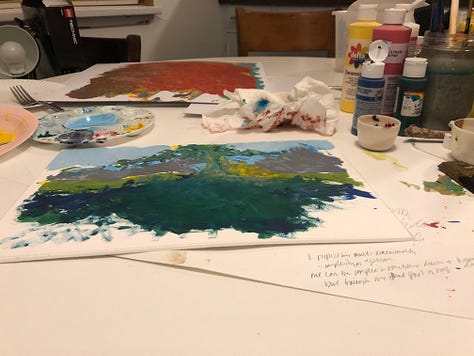
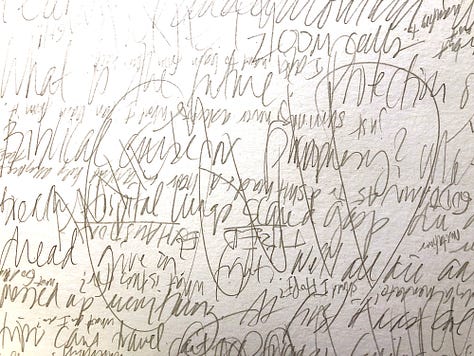

That spring was a time of intentional learning, reading, and questioning. In the spring and summer I read several impactful books and took a few classes online, including: a discussion group for women, an online group that I led to study the book Me and White Supremacy, a calligraphy and meditation workshop, and a painting course about finding your own authentic style. I participated in several workshops through an international calligraphy conference online. I learned about joy, radical rest, systemic racism, boundaries, breathing with calligraphy strokes, and trusting my artistic expression.
I still had a difficult time watching/listening to general conference, but I did tune into President Nelson’s Sunday morning session talk in April, titled “Christ Is Risen; Faith in Him Will Move Mountains.” I had hope that hearing his words on Easter Sunday would bring me strength. His talk was great until he said this:
“Lazy learners and lax disciples will always struggle to muster even a particle of faith.”
I yelled out, “No no no no No!” and burst into tears.
I struggle so much with worrying that I’m not doing enough, that I don’t have enough faith to merit any help from God. I just couldn’t bear to hear the prophet say that, which is too bad, because the rest of his talk is pretty good.
Later in April, I learned that someone important to me, Natasha Helfer Parker, was being subjected to a church disciplinary council, and then excommunicated. Natasha had an online presence for several years as the Mormon Therapist, and has her own private therapy practice, focusing on helping people heal from religious and sexual shame.
I was so angry that the church was disciplining her. As I mention in the following letter, Natasha was influential in helping Josh and I heal from sexual shame and the impact of the church on our mental health. Like many others in Mormon online communities, Josh and I wrote a letter to her Stake President to express our gratitude for Natasha and her positive impact in our lives:
President Daley,
We were alarmed and dismayed to learn of Dr. Natasha Helfer's disciplinary council. We have never met her, personally or professionally, but we have benefited deeply individually and as a couple from Dr. Helfer's willingness to speak boldly, candidly, and professionally about mental and sexual health among Mormons, and the very real harm that can be caused by the church's teachings and culture around sex and sexuality. It is not an overstatement to say that Dr. Helfer's public words - the very things that have invited this so-called "discipline" - have literally saved our lives.
Natasha's counsel helped us start and maintain an ongoing conversation between us about our mental health, trauma, and sexual shame within the church, and helped us learn how to nurture a healthy sexual relationship (an area in which the church is woefully lacking). Her point of view is needed in this church. Thousands and thousands of people are hurting every day in the same way we have. Their pain is real, and it matters. What message does the church send to people like us, for whom Dr. Helfer has done more for our mental health and wellbeing than any church leader ever has, by disciplining Dr. Helfer? How can someone who is hurting from being taught that their natural, harmless human urges are "sin next to murder" read this action as anything other than their church confirming their worst fears: that practicing healthy solo sexuality is a sin, and that they are sinners. Those poor souls will wrestle needlessly with that deadly shame for the rest of their lives, or until they're able to heal, let go, and move on from the harmful teachings of the church: whichever comes first.
Rachel & Josh Bancroft
Portland, Oregon
Natasha’s excommunication exacerbated my deep worry that if I ever said anything out loud that is contrary to what the church leaders say, I will be kicked out. Apostate. Unworthy of blessings. So I continued to keep a lot of my questions, ideas and spiritual insights to myself. I was so afraid. I began to have terrible nightmares of being disciplined by the church. In these dreams I was chased down by more valiant saints who thrust scriptures in my face and followed me everywhere I went, trying desperately to save my soul. The church’s way is the only way and I was astray.
There was one dream that I had over and over and over again: I am running through the Market Street Chapel (the church building of my youth) trying desperately to get out through one of the back doors. Faceless people (not really my ward members) are blocking my way and tackling me and trying to prevent my escape. They think they are pulling me back into safety. I struggle and push through them, and sometimes make it outside, running to Dari Mart, only to have them chasing after me.
The dream perplexed me, because I love my home ward, youth experiences, ward members and even the familiar smell of the church building that reminds me of one of those old mimeographs in the church library. But I look at it the dream as more representative, as dreams tend to be. I think the dream is more about me needing to free myself of my negative internalized spiritual beliefs, strict church teachings (the familiar brick building) that no longer serve me, and the yearning to expand my spirituality outside of Mormonism. The strong people represent the fear deep in my psyche that I will go to hell if I don’t stay within the orderly doctrinal box of the church, that spirituality outside of the church teachings is from the devil. That I must stay in safety and the only truth. That fear has been so difficult for me to break free from.
Around this time I began to wonder about the church's claim that it is the only true church on the earth. The only one with all the keys and ordinances necessary to get back to heaven. I asked myself (because I didn’t dare ask this outloud):
Why do we need to proclaim that we are the only true church?
Why do we need a true church?
Does God need a true church?
If our church is the only way back to God, then why only give it to a very miniscule amount of people? Why exclude some people?
Does it really mean that someone who is not a member of our church, tries their best in this damn hard life, will not receive celestial glory in the next life?
I studied talks from church leaders, who stated the usual things:
Our church has the only true priesthood authority. Everyone else’s is counterfeit.
Our church is modeled after the one Jesus created, therefore it is His true church.
Our church has all of the saving ordinances that are the ticket to the Celestial Kingdom.
There’s only one acceptable faith, one baptism, and one true church.
Those poor dears outside of our church will never experience true joy.
As I pondered and studied this question, I found that the phrase “a loving God” can lead to at least two different conclusions about a true church.
A loving God:
is one of order and authority and because he loves us so much he created only one strict path, a covenant path to follow so that we could earn our way back to Him. During his ministry, Jesus created a structure, a priesthood authority, a church leadership, a one right way.
who created the beautiful diversity of all of humankind, would not require a strict set of rules to get to heaven. He embraces the many different ways of spirituality. Jesus never taught conformity and uniformity. He didn’t care so much about the rules as how we treat each other.
I asked my questions on a few online forums and received interesting answers:
One pastor said that in the broader Christian tradition, “the church” includes all expressions of the Christian faith. The Mormon The understanding of “the church” in the broader Christian tradition - includes all expressions of the Christian faith, people who have accepted Jesus Christ. Mormon exclusivism is unique.
Another person compared religion to a compass. We use the compass, searching for the same general destination (fulfillment, love, God, etc…), but because we live in different parts of the world, with a variety of cultures, backgrounds, governments, personalities and families, our compasses point in different directions. I use the Latter Day Saint compass, but it is not more true or correct than any other compass.
We say that we are the true church because we need to feel special. We need to say it’s true as much as possible to convince ourselves of it.
Maybe “this church is true” means more that we find God in it. Is my faith strengthened here? Do I find Christ here?
Just because a church or belief system resounds with me, it doesn’t mean that it is the path for everyone.
I found this quote from Jana Reiss:
In the 20th century, the idea of the “one true church” became more important in Latter-day Saint thought. (Another General Conference time capsule: In the 1970s, there were 94 references to “true church” from church leaders, which was almost as many as occurred in the entire 19th century [99].)
A second issue is that too much focus on the “one true church” may also miss the point of how God is working through many different people and different religions to achieve a holy purpose.
By Jana Riess | Religion News Service
Feb. 4, 2021, 6:36 p.m
“Why Latter-day Saints may be selling the ‘restoration’ short by focusing on ‘one true church’”
|
Ooh. I like that. That God works through many different people and different religions to achieve His holy purpose.
I haven’t really ever come to a conclusion about my questions about the true church. I do know that saying that I belong to the one true church feels really conceited and I’m uncomfortable with it. I’m leaning more towards believing I belong to a generally good church, but it’s not for everyone. And that’s ok.


